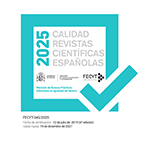Rural communities and management issues in the jurisdiction of Piedrahíta (fifteenth century)
Abstract
The degree of autonomy of the village councils in the municipal district of Piedrahíta is analysed from a twofold perspective: the management of the territory by urban authorities (i.e. tax collection, control over common resources, distribution of coercive tasks and justice) and the performance of village authorities at the local level. It is posited that the relative autonomy of the village councils is a core aspiration of the local political community, as well as a feature of a management scheme that tends to delegate the administration of the jurisdiction to lower-ranking officials and to a tax collection system based on peasant involvement. This form of management favours the village leaders’ economies and breeds practices that go against the common interest.Downloads
Article download
License
In order to support the global exchange of knowledge, the journal En la España Medieval is allowing unrestricted access to its content as from its publication in this electronic edition, and as such it is an open-access journal. The originals published in this journal are the property of the Complutense University of Madrid and any reproduction thereof in full or in part must cite the source. All content is distributed under a Creative Commons Attribution 4.0 use and distribution licence (CC BY 4.0). This circumstance must be expressly stated in these terms where necessary. You can view the summary and the complete legal text of the licence.
En la España Medieval is an open access journal that does not charge authors for article processing (submission, review or editing) or publication.












